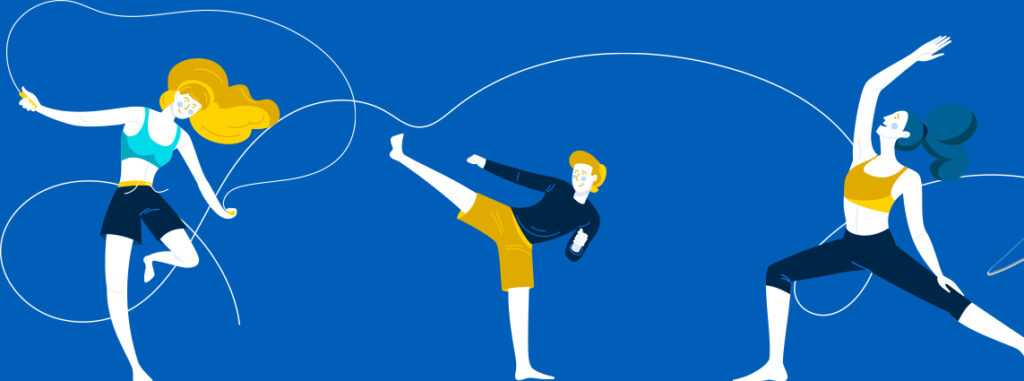You might have heard people speaking about how post every meal it is beneficial to take a 10 minute walk to digest your food. You might have also heard how hitting a 10,000 step count is proved to be a great form of exercise which burns around 400-500 calories. The common element among these statements is the importance of being active and moving for all age groups into ones daily life. Whether you are 12, 21 or 41 it is very important to stay active and include some movement into your daily routine. Incorporating movement into one’s life can prove beneficial and has several benefits regardless of one’s age, sex, race, ethnicity or fitness level.
In the 21st century often people do not make time to stay active and moving in their daily routine. You might have a busy schedule but it is important to stay physically active to stay healthy. There are several benefits of being active as well. The benefits not only affect your physical health but also your psychological health.
Being physically active can improve brain health, help manage weight, reduce the risk of disease, strengthen bones and muscles and improve your ability to do every day activities with more ease
(Centres for Disease Control and Prevention, 2022).
Being ACTIVE
The importance of being active and moving in your daily life is crucial from the time that a person is a pre-schooler till the time they grow older. The table below provides an understanding of the physical activity recommendations for different age groups.
Importance of being active throughout life.
Why age also plays such a crucial factor in staying active is that half of the physical decline associated with ageing maybe due to lack of physical activity. Without regular physical exercise, people over the age of 50 can experience a range of physical exercises such as reduced strength and physical endurance, reduced coordination and balance, reduced cardiovascular and respiratory function and increased blood pressure and risk of various disease. There also common myths related to older people exercising, such as the human body does not need as much physical activity as it ages, older people are frail and physically weak and exercising is hazardous for older people because they may injure themselves.
Even for children from a very young age, being active can benefit in a child in more ways than one. Children who are active and get enough movement in are more likely to keep exercising as adults. It also helps them maintain a healthy body weight and build strong, healthy muscles. Exercising also aids in the development of interpersonal skills through team games and sports. Exercise also improves the quantity and quality of sleep. Research shows exercise promotes improved school attendance and enhances academic performance. Participating in regular physical activity prevents or delays the development of many chronic diseases (e.g., heart disease, diabetes, obesity, hypertension) and promotes health.
Exercise helps improve motor coordination and enhances the development of various motor performance skills
(Trautner, 2017).
Recommendations for staying active and moving:
Following are a few recommendations of how to stay active when you have a busy schedule or are just starting out with a goal to stay active and moving:
- Choose activities that you find interesting and can stick to. If you choose an activity that is overly challenging, chances are you will give up too soon.
- Try incorporating at least 30 mins of ‘active’ time in your daily routine. Whether it be taking your pet for a walk or taking the stairs instead of the lift.
- Take it easy in the beginning as your body might not be used to the activity and if you start doing too much at once, chances are you might injure yourself.
- Incorporate walking into your routine to get some movement in from time to time. This can be when you are on the phone with someone or on a work call. It can be a great way to stay active and mix up your routine.
- Parking far away from where you need to go can not only motivate you to walk till your destination but also leave you with no option but to get your steps in.
- Tracking your progress or your active days can also be very beneficial. Having the days where you have had movement or been active can be a healthy reminder that you are getting closer to your goal. It can also push you to stay active on days that you want to be lazy and not meet your goals.
- Establish some accountability by either by a fitness tracker or appointing someone like your significant other or a friend to keep you true to your goals. This way you can be pushed to achieve your goals on days you are struggling with the internal motivation.
- Try to make it a habit. For example, every day in the evening or morning try going for a 30 minute walk, so it gets incorporated in your daily routine. The more you start practising it the easier the habit will become to follow.
Conclusion:
Anything is possible if you make up your will to do it. The importance of being active and moving is not only something you need to do when you are young but also continue when you are older. So what are you waiting for? get active and get moving, your body will thank you for it a couple of years down the line.
References
https://www.cdc.gov/physicalactivity/basics/pa-health/index.htm
https://www.canr.msu.edu/news/benefits_of_children_being_active
You may also read:
